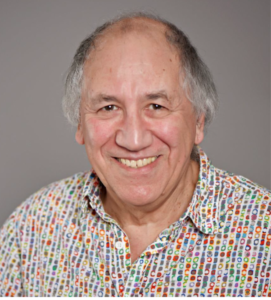Save the World – Shining Light on CO2
Geoffrey Ozin (University of Toronto)
ABSTRACT:
Energy makes the world go round, we have plenty of it, and it is mainly fossil sourced. In 2020 we used 23,000 TWh, that’s the good news, the bad news is that the 40 billion tons of CO2 emitted into our atmosphere from its production, distribution, and use is now posing an existential threat to life on earth, and it is getting worse. The solution is simple on paper but complex in practice; transition from fossil to renewable forms of energy using known technologies that work, can be scaled, implemented over a decade or so, and go global. While not a panacea, one approach to help ameliorate climate change, is to decarbonize the fossil powered and fossil sourced chemical and petrochemical industries using CO2 as the feedstock. Manufacturers of hundreds of millions of tons of chemicals and fuels, these industries would not exist without catalysts; more than 90% are heterogeneous, their production represents a $8.5 billion per year market, and the gross annual sales of chemicals synthesized by catalysis is $3 trillion. Currently, most of these catalytic processes are driven by fossil heat and are responsible for about 2.3 billion tons of CO2 emissions, about 5.8% of global greenhouse gas emissions. Syngas, a fossil derived mixture of CO and H2, is a primary feedstock for hundreds of thousands of commodity chemicals and many transportation fuels. Commercially available technology exists, for making syngas from CO2 and H2O feedstocks, mainly driven by heat, thermochemically. Why not power them with light, photochemically? In this presentation I will look what is around the bend in this emerging field, especially the most recent focus on how to engineer high photon efficiency photocatalysts and photoreactors to produce solar syngas, a sustainable feedstock for myriad solar chemicals and fuels.
BIO:
 Geoffrey A. Ozin is a Distinguished University Professor at the University of Toronto and Tier 1 Government of Canada Research Chair in Materials Chemistry and Nanochemistry. He currently spearheads the Solar Fuels Group at the University of Toronto. He has held positions as Honorary Professor at The Royal Institution of Great Britain and University College London, External Adviser for the London Centre for Nanotechnology, Alexander von Humboldt Senior Scientist at the Max Planck Institute for Surface and Colloid Science and the Center for Functional Nanostructures at the Karlsruhe Institute of Technology, and Global Chair at Bath University. He is the author of five books: Cryochemistry (Wiley 1986), Nanochemistry: A Chemical Approach to Nanomaterials (RSC 2006), Concepts of Nanochemistry (Wiley-VCH 2009), The Story of CO2: Big Ideas for a Small Molecule (UTP 2020), and Energy Materials Discovery Enables a Sustainable Future (RSC 2021), and recipient of many National and International Awards, recent ones include World Cultural Council Albert Einstein Science Prize, World Technology Network Energy Prize, Royal Society of Chemistry Centenary Award. He lives with his wife in Toronto, Canada.
Geoffrey A. Ozin is a Distinguished University Professor at the University of Toronto and Tier 1 Government of Canada Research Chair in Materials Chemistry and Nanochemistry. He currently spearheads the Solar Fuels Group at the University of Toronto. He has held positions as Honorary Professor at The Royal Institution of Great Britain and University College London, External Adviser for the London Centre for Nanotechnology, Alexander von Humboldt Senior Scientist at the Max Planck Institute for Surface and Colloid Science and the Center for Functional Nanostructures at the Karlsruhe Institute of Technology, and Global Chair at Bath University. He is the author of five books: Cryochemistry (Wiley 1986), Nanochemistry: A Chemical Approach to Nanomaterials (RSC 2006), Concepts of Nanochemistry (Wiley-VCH 2009), The Story of CO2: Big Ideas for a Small Molecule (UTP 2020), and Energy Materials Discovery Enables a Sustainable Future (RSC 2021), and recipient of many National and International Awards, recent ones include World Cultural Council Albert Einstein Science Prize, World Technology Network Energy Prize, Royal Society of Chemistry Centenary Award. He lives with his wife in Toronto, Canada.
